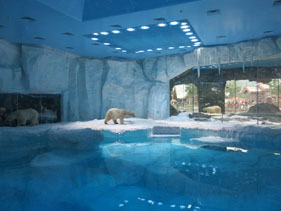China’s booming ocean parks mean misery for bears

Polar bears pace in enclosures at Chimelong Ocean Kingdom in the southern Chinese city of Zhuhai on Feb. 2, 2016. (Simon Denyer/The Washington Post)
China’s booming ocean parks mean misery for bears, belugas and more writes Simon Denyer in the Washington Post
ZHUHAI, China — The polar bears pace back and forth in their enclosure, heads lolling as they turn, their distress apparent. Chinese tourists crowd around display windows to snap quick close-ups on their phones.
Beluga whales nod in time to loud music, "kiss" children or spit plumes of water toward gasping crowds. A walrus blows a trumpet, seals catch Frisbees and dolphins propel their trainers through the water on their beaks.
Chimelong Ocean Kingdom here is the largest of China’s 39 ocean theme parks, the flagship of a booming industry that is capturing some of the world’s most magnificent and intelligent animals from the wild and keeping many of them in cramped, inadequate conditions.
Attendance has been dropping at some of the roughly 30 such ocean theme parks in the United States in the wake of reports about the welfare of sea mammals in captivity.
But in China, the industry cannot expand rapidly enough to satisfy the nation’s apparent hunger to watch animals perform. Sixteen parks are under construction, and Chimelong’s park in Zhuhai, close to Macao on China’s southern coast, recorded 80,000 visitors in a single day last year.
A new report by the China Cetacean Alliance (CCA), a coalition of international animal-protection groups, says the parks house 491 cetaceans — a category of marine mammals — including 279 bottlenose dolphins, 114 belugas and nine orcas.
Most of those animals were caught in the waters of Russia, Japan and the Solomon Islands by methods that are "known to cause stress and fear in free-ranging individuals," the report said.
China’s ocean-theme-park industry is accused of catching hundreds of dolphins, belugas and other marine mammals from the wild and keeping them in unsuitable conditions. (Xu Jing/The Washington Post)
"Such captures also disrupt normal social groups," it said, adding that for some species the disruption is "definitely contributing to population decline." In captivity, the report said, many animals are probably living in conditions that are "inadequate to meet the complex physical and behavioral needs of cetaceans."
Belugas, or white whales, are listed as "near threatened" under the Convention on International Trade in Endangered Species of Wild Fauna and Flora (CITES), an international treaty signed in 1973 to protect wildlife against overexploitation. Virtually all of the belugas in China are imported from Russia, where the population is falling, the CCA said, at a reported price of $125,000 to $240,000 each.
Intensely social animals, belugas can swim up to 100 miles a day in the wild and routinely dive 30 to 1,000 feet in arctic and subarctic waters. In captivity, they circle back and forth in shallow, featureless tanks and are taught to perform tricks that conflict with their natural behaviors.
Chinese media reported the first birth of a beluga in captivity here in 2014. The calf died within a month, the CCA said, citing park staff members who said the animal is believed to have died because the tank was too small to allow its mother to nurse it.
Chimelong has 18 belugas and 41 bottlenose dolphins, according to the CCA, and it has three polar bears on public display. Whale sharks swim in a giant aquarium beside the park’s fanciest restaurant, while outside, roller-coaster rides, carousels and parades of ocean-themed floats follow the formula popularized by SeaWorld in Florida, rendered with a dash of Disney and a Chinese twist.
Still, it is the only ocean theme park in China that provides public information about financial support for the conservation of cetaceans in their natural habitat.
In a shopping mall in the southern city of Guangzhou, Grandview Mall Ocean World offers a lower-budget vision that still brings in crowds.
A lone white bear paces in a tiny enclosure; billed as a polar bear, it is most likely a cross between a brown bear and a polar bear, experts said. Five walrus calves swim in a small, dirty tank, and arctic wolves lie listlessly in a room, while six belugas peer through glass at tourists.
.
 United Kingdom
United Kingdom United States
United States Asia Pacific
Asia Pacific












































BA suspending all Heathrow to Abu Dhabi flights
Unexpected wave rocks cruise ship
Report: Cruise guest died after ship lashed in heavy storm
British teen in serious condition after paraglider collision
JetBlue scraps London Gatwick flights